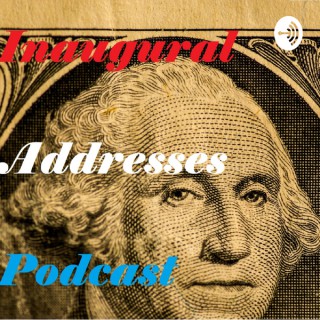Inaugural Addresses Podcast
Follow Inaugural Addresses PodcastAll the Presidents' inaugural addresses, from Washington to Trump.
- Mar 16, 2021 LATEST EPISODE
- monthly NEW EPISODES
- 21m AVG DURATION
- 23 EPISODES
Latest episodes from Inaugural Addresses Podcast

Andrew Johnson's Address Upon Assuming the Office of President - April 17, 1865
In this episode, Johnson says it's too soon after Lincoln's assassination for him to think about specific policies, but he's always done what he thought was right, and he plans to continue doing so.

Lincoln sees God's hand at work, even in the midst of war. He discusses how things got to this point, and hopes for an end to the war, with healing for the nation afterward.

With the country on the brink of civil war, Lincoln appeals to his fellow citizens to slow down, think things through, and keep the United States united.

James Buchanan hopes the issue of slavery is settled, and that we can stop talking about it and focus on more pressing matters, like defending California from possible enemy attacks. You know, really pressing things like that.

Franklin Pierce doesn't really want to be president, but he thinks America is great, and should keep growing and becoming greater, and he has some ideas on how to do that. Also, slavery is perfectly Constitutional, and he hopes everyone can be okay with that.

In this short message on the death of Zachary Taylor, Millard Fillmore pays his respects, and asks Congress to help him as he begins his presidency.

Zachary Taylor takes his cues from history, from the Constitution, and from Congress. He wants to represent everybody, and basically not shake things up too much.

Regarding slavery, we just have to agree to disagree, so we can stay united. Try to get along. And if you keep making it an issue, then you probably hate America. Also, to the world, don't mess with Texas: it's a State now. Plus! Finances!

John Tyler's Address Upon Assuming the Office of President - April 9, 1841
No more Tippecanoe, but we still have Tyler too. After the first death of a sitting president, John Tyler steps in and lets everyone know he's in charge now.

William Henry Harrison explains at GREAT length his opinions on the Executive branch, the veto power, the "spirit of liberty," and much, much more. He thinks the country's going downhill, and thank goodness he's here to get things back on track. Unfortunately... (spoiler alert?)......he won't be around long.

Martin van Buren praises the founders of the nation, loves the fact that America has overcome all the dangers that have arisen and is still going strong, and makes it clear that he's definitely not going to abolish slavery. Come on, Martin, it sounded so good until then.

The federal government must respect the rights of the states, and the states must obey the federal laws. The unity of the country must be preserved! It will take sacrifice and compromise, so let's all work together on this. The world is watching.

Andrew Jackson is going to manage things much better THAN SOME PEOPLE (cough cough John Quincy Adams)! Some of the ways he will do this include responsible management of money and the armed forces, and appointing more, ahem, "competent" officials.

John Quincy Adams looks to the past and the future, encourages political parties to stop fighting and work together, and intends to do everything Monroe did. Also, we need to build roads; why is this a problem?

James Monroe loves forts and hates pirates. He's glad to be reelected. Plus! all of America's foreign policy from his first term!

Life is good, and James Monroe wants to keep making it better! (by peace through strength, improved infrastructure, and a strong economy)

As the War of 1812 rages on, Madison explains why America is in the right and reminds us that the British are jerks.

James Madison talks about some countries who are causing trouble (he doesn't name names, but, France and Britain) by fighting each other, and how the US is trying hard to remain neutral, then lists his priorities as President. Also, good job Thomas Jefferson!

In this episode, Jefferson gets rid of taxes, wants to “enlighten” the Indians, and complains about fake news.

In this episode, Thomas Jefferson says we're all really on the same side, and describes his idea of a good government.

John Adams gives a brief history of the US Constitution, thanks George Washington for doing a great job, and tells us why he will be a good president.

George Washington's super short second inaugural address. This time at Congress Hall, Philadelphia!

In this, the inaugural episode of the Inaugural Addresses Podcast, you will hear our country's very first presidential inaugural address, given by the man himself, George Washington. He gave this address, not at the Capitol Building (it hadn't been built yet) but at Federal Hall in New York City.








